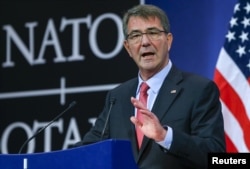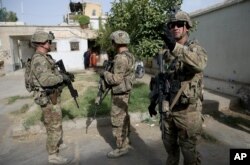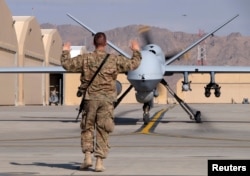U.S. Defense Secretary Ash Carter says President-elect Donald Trump's administration should maintain partnerships with NATO and allies in the Asia-Pacific, while also holding Russia accountable to its stated mission of battling terrorists in Syria and help end the war.
The recommendations came in a memo that Carter, like the other Cabinet secretaries, prepared to highlight what their departments achieved during the eight-year presidency of Barack Obama. The documents were released Thursday, along with a letter from Obama, about two weeks before Trump takes over the White House.
Carter highlighted U.S. responses to Russia's 2014 annexation of Crimea, including boosting joint military exercises and prepositioning equipment in the region.
"The United States must remain engaged with NATO — an alliance of principled and like-minded members backed by strength — to ensure continued progress and to deter and defend against Russian aggression in Europe," he said.
Holding Russia accountable
Russia launched its military operation in Syria in late 2015 in support of President Bashar al-Assad, a move that Carter said has only made the conflict there "more dangerous and violent, and potentially more prolonged."
Syrian forces have scored major victories against rebel groups since Russia began backing them, including last month retaking full control of the city of Aleppo.
Russia entered the conflict saying it was there to go after terrorists, but many of their airstrikes have struck areas controlled by moderate opposition fighters.
Carter also focused on Iran, saying its backing of Assad, the Lebanon-based militant group Hezbollah and Houthi rebels in Yemen are examples of the "malign influence" Iran has in the Middle East.
Defending Iran agreement
But he also pointed to the agreement that Iran reached with a group of six world powers to curb the country's nuclear program in exchange for sanctions relief. U.S. ally Israel has denounced the deal, and Trump has expressed his opposition, including calling it "the worst deal ever negotiated."
"The International Atomic Energy Agency has confirmed that Iran is complying with its international commitments, and it is in our best interest to maintain the agreement to check Iran's nuclear ambition," Carter wrote.
He said a priority for Trump should be the continued partnership with Israel, which has a commitment to receive $38 billion in security assistance over the course of 10 years. The Pentagon chief highlighted other security deals in the region, including partnerships with members of the Gulf Cooperation Council and the sale of more than $100 billion in arms to Gulf partners.
Troops drawdown
The major change in the Defense Department under Obama was the winding down of the wars in Iraq and Afghanistan, which began under his predecessor, President George W. Bush. Combat operations in Iraq ended in 2011 and in Afghanistan in 2014 as security control went into the hands of local forces built up with the help of the U.S.
In his own letter issued Thursday, Obama touted the lack of any foreign terrorist attack carried out in the U.S. during his term as well as the ongoing efforts to defeat Islamic State in Iraq and Syria.
"We've drawn down from nearly 180,000 troops in harm's way in Iraq and Afghanistan to just 15,000," Obama wrote. "With a coalition of more than 70 nations and a relentless campaign of more than 16,000 airstrikes so far, we are breaking the back of ISIL and taking away its safe havens, and we've accomplished this at a cost of $10 billion over two years -- the same amount that we spent in one month at the height of the Iraq War."
Carter cited the 2011 U.S. operation that killed al-Qaida leader Osama bin Laden and last year's killing of Taliban leader Mullah Akhtar Mansur.
Airstrikes
Under Obama, the military, as well as the Central Intelligence Agency, drastically ramped up the use of drones to carry out attacks against terrorists. Carter said the military's unmanned aircraft pilots now outnumber its pilots in manned aircraft.
But those increased airstrikes came with concerns about who was being hit and how the strikes were being approved.
Carter's memo talks about efforts to promote transparency in U.S. military actions, including the release of reports about civilian casualties and discussing the legal and policy bases for certain actions.
The White House has released reports about the number of civilians killed in its airstrikes, but those were met by criticism from outside groups whose estimates were far higher than the official totals. The Obama administration also released an 18-page document last year about the decisions for targeting of terrorists in drone strikes and safeguards for preventing civilian casualties.
Cultural changes at Pentagon
Carter's document touched on cultural changes within the military during the past eight years. He said the Pentagon has shown a "renewed resolve" to prevent soldier suicides, and prioritized eradicating sexual harassment. He pointed to Obama's decision to end the military's policy against gay service members serving openly and to end the ban on transgender service members. Obama also opened all military positions to women.
The outgoing Pentagon chief directed some criticism at Congress, saying his department became smaller and more capable while dealing with hundreds of billions of dollars in reductions stemming from a 2011 budget battle. Carter said the military faced "significant impediments presented by Congress" that included efforts to micromanage the Defense Department.









